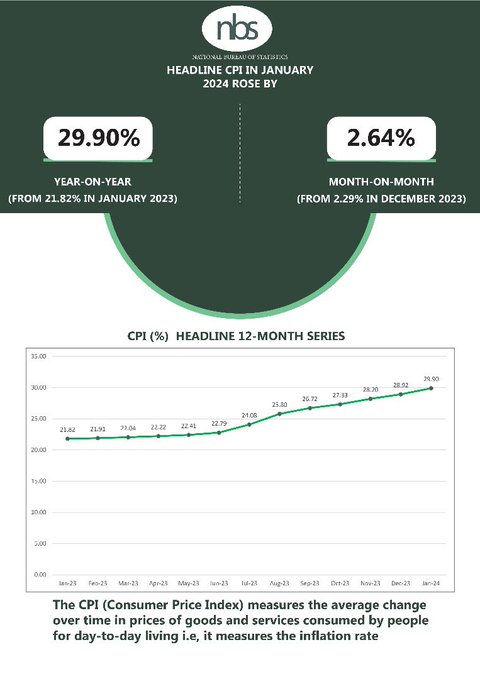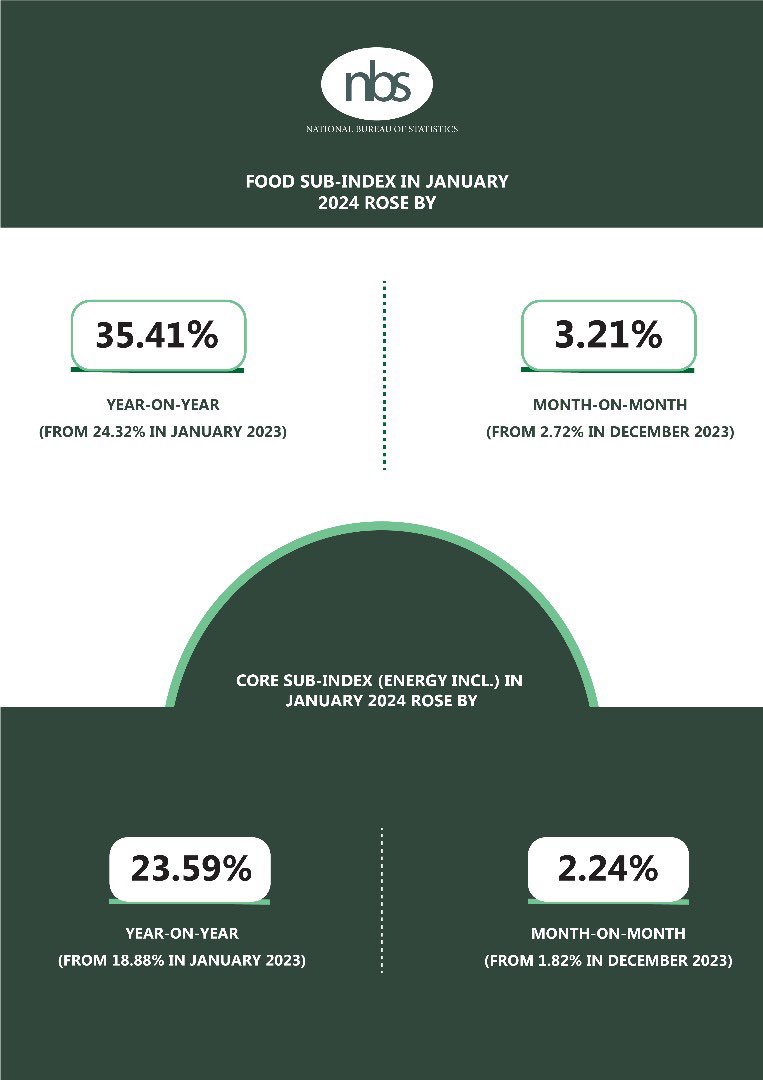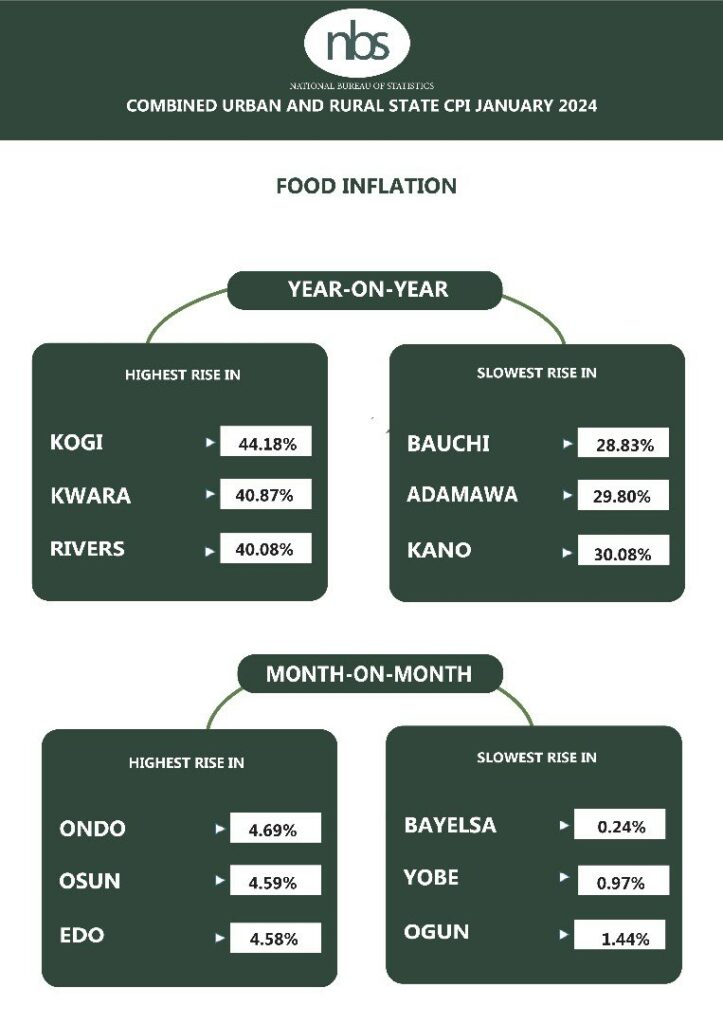The National Bureau of Statistics (NBS) says Nigeria’s headline inflation rate increased to 29.90 per cent in January 2024 from 28.92 per cent recorded in December 2023.
The NBS disclosed this in its Consumer Price Index (CPI) and Inflation Report for December, which was released in Abuja on Thursday.
According to the bureau, the figure is 0.98 per cent points higher compared to the 28.92 per cent recorded in December 2023.
Similarly,the bureau said , on a year-on-year basis, the headline inflation rate was 8.08 per cent points higher compared to the rate recorded in January 2023, which was 21.82 per cent.
.”It said on a year-on-year basis, the headline inflation rate in January 2024 was 8.08 per cent higher than the rate recorded in January 2023 at 21.82 per cent.
In addition, the report said, on a month-on-month basis, the headline inflation rate in January 2024 was 2.64 per cent, which was 0.35 per cent higher than the rate recorded in December 2023 at 2.29 per cent.
” This means that in January 2024, the rate of increase in the average price level is more than the rate of increase in the average price level in December 2023.”
The report said the increase in the headline index for January 2024 on a year-on-year basis and month-on-month basis was attributed to the increase in some items in the basket of goods and services at the divisional level.
It said these increases were observed in food and non-alcoholic beverages, housing, water, electricity, gas, and other fuel, clothing and footwear, and transport.
Others are furnishings, household equipment and maintenance, education, health, miscellaneous goods and services, restaurants and hotels, alcoholic beverage, tobacco and kola, recreation and culture, and communication.
The bureau said the percentage change in the average CPI for the 12 months ending January 2024 over the average of the CPI for the previous corresponding 12-month period was 25.35 per cent.
“This indicates a 5.99 per cent increase compared to 19.36 per cent recorded in January 2023.”
The report said the food inflation rate in January 2024 increased to 35.41 per cent on a year-on-year basis, which was 11.10 per cent higher compared to the rate recorded in January 2023 at 24.32 per cent.
“The rise in food inflation on a year-on-year basis is caused by increases in prices of bread and cereals, oil and fat, potatoes, yam and other tubers, fish, meat, fruit, coffee, tea, and cocoa. ”
It said on a month-on-month basis, the food inflation rate in January was 3.21 per cent, which was a 0.49 per cent increase compared to the rate recorded in December 2023 at 2.72 per cent.
“The rise in food inflation on a month-on-month basis was caused by an increase in the average prices of potatoes, yam and other tubers, bread and cereals, fish, meat, tobacco, and vegetable.”
The report said that “All items less farm produce and energy’’ or core inflation, which excludes the prices of volatile agricultural produce and energy, stood at 23.59 per cent in January on a year-on-year basis.
“This increased by 4.71 per cent compared to 18.88 per cent recorded in January 2023.’’
“The exclusion of the PMS is due to the deregulation of the commodity by removal of subsidy.”


It said the highest increases were recorded in prices of passenger transport by road, medical services, actual and imputed rentals for housing, pharmaceutical products, accommodation service, and passenger transport by air, etc.
The NBS said on a month-on-month basis, the core inflation rate was 2.24 per cent in January 2024.
“This indicates a 0.42 per cent rise compared to what was recorded in December 2023 at 1.82 per cent.”
“The average 12-month annual inflation rate was 21.15 per cent for the 12 months ending January 2024, this was 4.74 per cent points higher than the 16.41 per cent recorded in January 2023.”
The report said on a year-on-year basis in January 2024, the urban inflation rate was 31.95 per cent, which was 9.40 per cent higher compared to the 22.55 per cent recorded in January 2023.
“On a month-on-month basis, the urban inflation rate was 2.72 per cent in January representing a 0.30 per cent increase compared to December 2023 at 2.42 per cent.”
INVESTIGATION: Untold Story of Maltreatment, Human Rights Violations at Dangote Refinery
The report said on a year-on-year basis in January 2024, the rural inflation rate was 28.10 per cent, which was 6.97 per cent higher compared to the 21.13 per cent recorded in January 2023.
“On a month-on-month basis, the rural inflation rate was 2.57 per cent, which increased by 0.40 per cent compared to December 2023 at 2.17 per cent.’’
On states’ profile analysis, the report showed in January, all items inflation rate on a year-on-year basis was highest in Kogi at 35.79 per cent, followed by Oyo at 34.58 per cent, and Akwa Ibom at 33.16 per cent.
It, however, said the slowest rise in headline inflation on a year-on-year basis was recorded in Borno at 22.57 per cent, followed by Taraba at 24.83 per cent, and Benue at 26.64 per cent.
The NBS, however, said in January 2024, all items inflation rate on a month-on-month basis was highest in Ondo at 3.79 per cent, followed by Osun at 3.77 per cent, and Jigawa at 3.58 per cent.
“Bayelsa at 0.45 per cent, followed by Yobe at 1.10 per cent and Ogun at 1.35 per cent recorded the slowest rise in month-on-month inflation.”
The bureau said on a year-on-year basis, food inflation was highest in Kogi at 44.18 per cent, followed by Kwara at 40.87 per cent, and Rivers at 40.08 per cent.
“Bauchi at 28.83 per cent, followed by Adamawa at 29.80 per cent and Kano at 30.08 per cent recorded the slowest rise in food inflation on a year-on-year basis.’’
The NBS, however, said on a month-on-month basis, food inflation was highest in Ondo at 4.69 per cent, followed by Osun at 4.59 per cent, and Edo at 4.58 per cent.
“In Bayelsa, it was at 0.24 per cent, followed by Yobe at 0.97 per cent and Ogun at 1.44 per cent, recorded the slowest rise in inflation on a month-on-month basis.”





